Key takeaways:
- Open-source contributions foster personal growth and community engagement, encouraging collaboration and knowledge sharing.
- Participating in open-source projects democratizes technology, allowing contributors at all levels to influence software used globally.
- Challenges such as understanding complex codebases, managing community expectations, and balancing time commitments are common in open-source contributions.
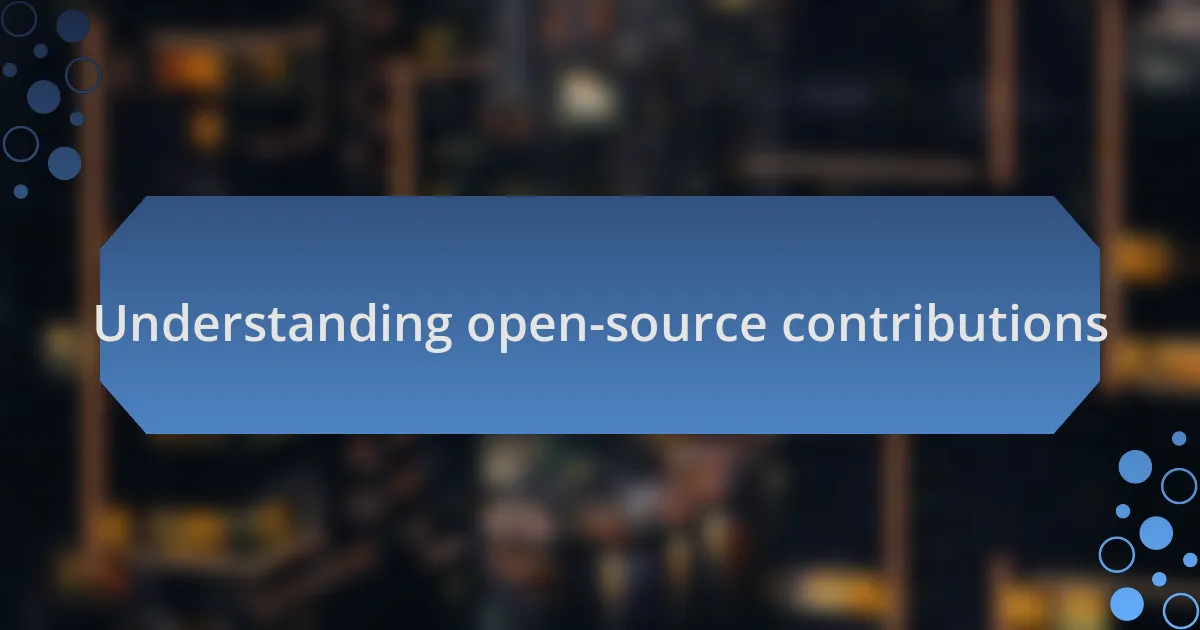
Understanding open-source contributions
Open-source contributions are more than just coding; they represent a community-driven effort to build and share software. I remember my first experience contributing to an open-source project—it was daunting but exhilarating. I had this overwhelming feeling of being part of something bigger than myself, and it pushed me to learn and grow in ways I hadn’t anticipated.
When I first dived into the world of open-source, I found it humbling to collaborate with individuals from diverse backgrounds. Each pull request almost felt like a conversation, filled with feedback and collaboration. It’s intriguing to think: have you ever experienced that rush of seeing your work impact users around the globe? That sense of achievement kept me motivated, even through challenges.
Contributing to open-source also taught me the importance of transparency and documentation. I vividly recall how a simple comment on a project helped clarify a complex issue for someone else. It struck me that open-source isn’t just about the code; it’s about the relationships and knowledge sharing within the community. Engaging with others who are equally passionate enhances the experience, don’t you think?
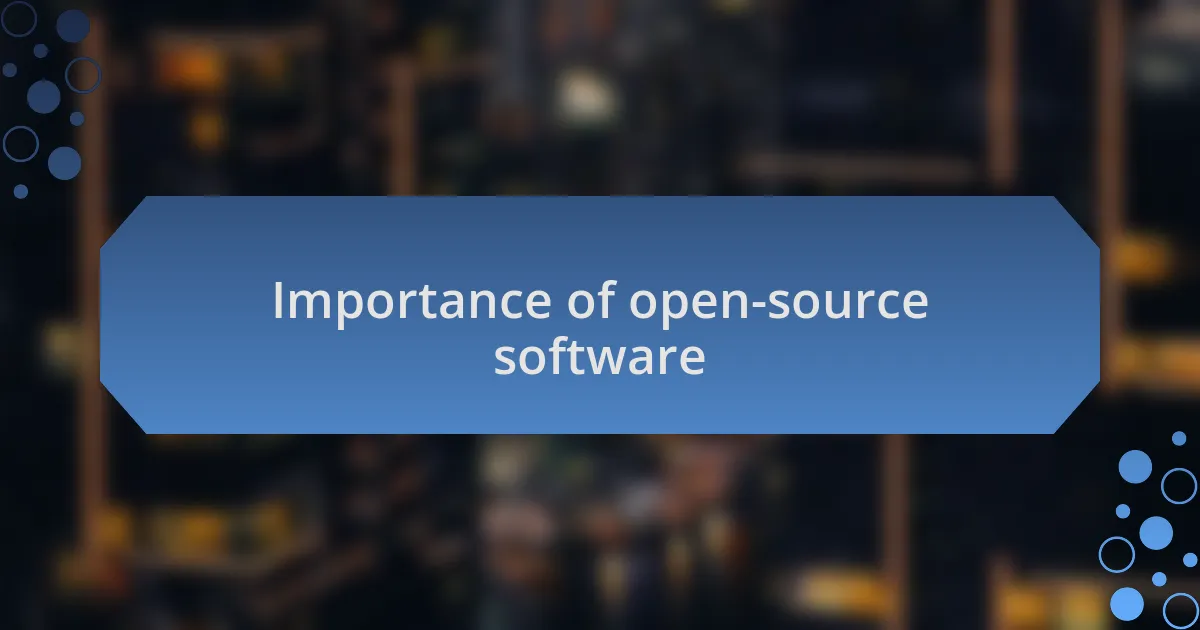
Importance of open-source software
The importance of open-source software can’t be overstated, especially for those of us navigating the tech landscape. When I think about the impact of open-source, I’m reminded of a project where collaboration among developers led to rapid innovation. It was inspiring to witness how a community could accelerate development through shared ideas and code, allowing us all to benefit from each other’s work.
One of the most compelling aspects of open-source software is its ability to democratize technology. I recall feeling empowered when I realized that contributors like me—regardless of our experience level—could influence software that millions might use. Isn’t it fascinating how anyone with passion and commitment can leave a mark? This inclusivity not only fosters creativity but also encourages a culture of continuous learning.
Additionally, open-source models often lead to higher security and reliability. I once encountered a bug in a popular project, and I was amazed at how quickly the community rallied to address it. This responsiveness reminded me that with so many eyes reviewing the code, vulnerabilities tend to be identified and fixed faster than in proprietary software. Isn’t it reassuring to know that when we contribute, we’re also helping to create more secure and trustworthy software for everyone?
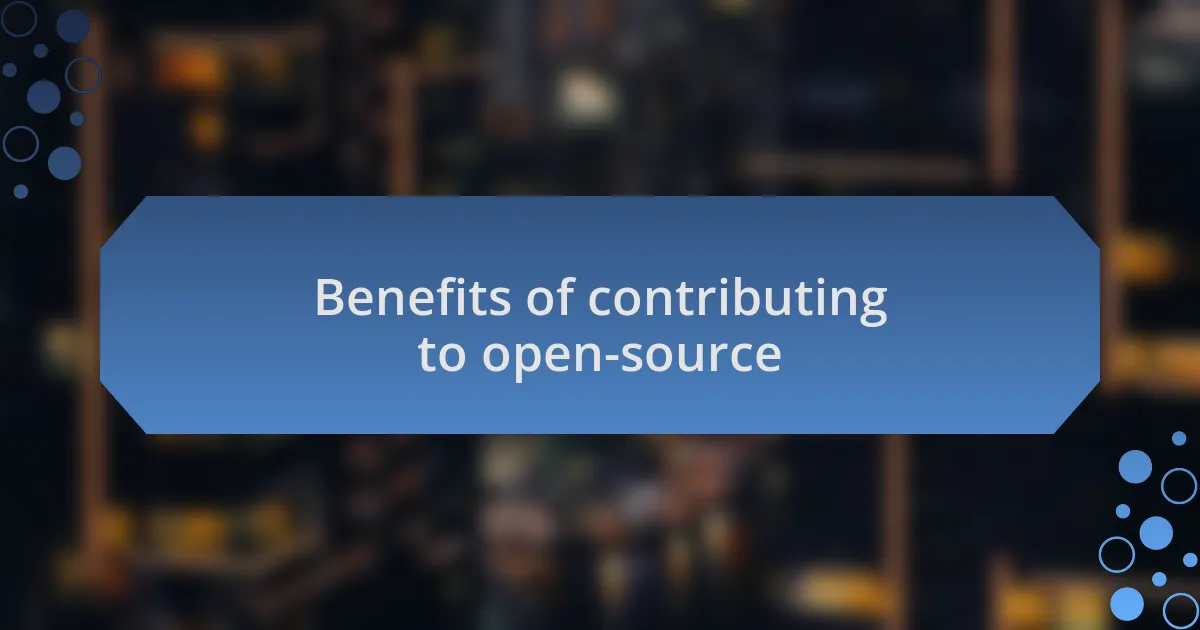
Benefits of contributing to open-source
Contributing to open-source projects has been a gateway for personal growth in my programming journey. I distinctly remember tackling a challenging issue in a codebase that at first seemed overwhelming. The sense of accomplishment I felt after successfully resolving it was incredible; it boosted my confidence and deepened my technical skills. Isn’t it amazing how stepping out of your comfort zone can lead to such growth?
One of the unexpected joys I’ve found in open-source contributions is the sense of community it cultivates. The first time I joined a discussion forum for a project, I felt a mix of excitement and nervousness. However, the support from fellow contributors transformed that initial apprehension into a feeling of belonging. This connectedness not only makes the work more enjoyable but also turns every contribution into a collaborative effort that amplifies the impact of our skills.
Moreover, sharing knowledge through open-source contributions creates valuable visibility in the tech community. After submitting my first pull request, I was surprised by the feedback I received from seasoned developers. That interaction not only improved my code but also opened doors to new opportunities in my career. Isn’t it encouraging to think that one small contribution can lead to significant advancements in both personal and professional realms?
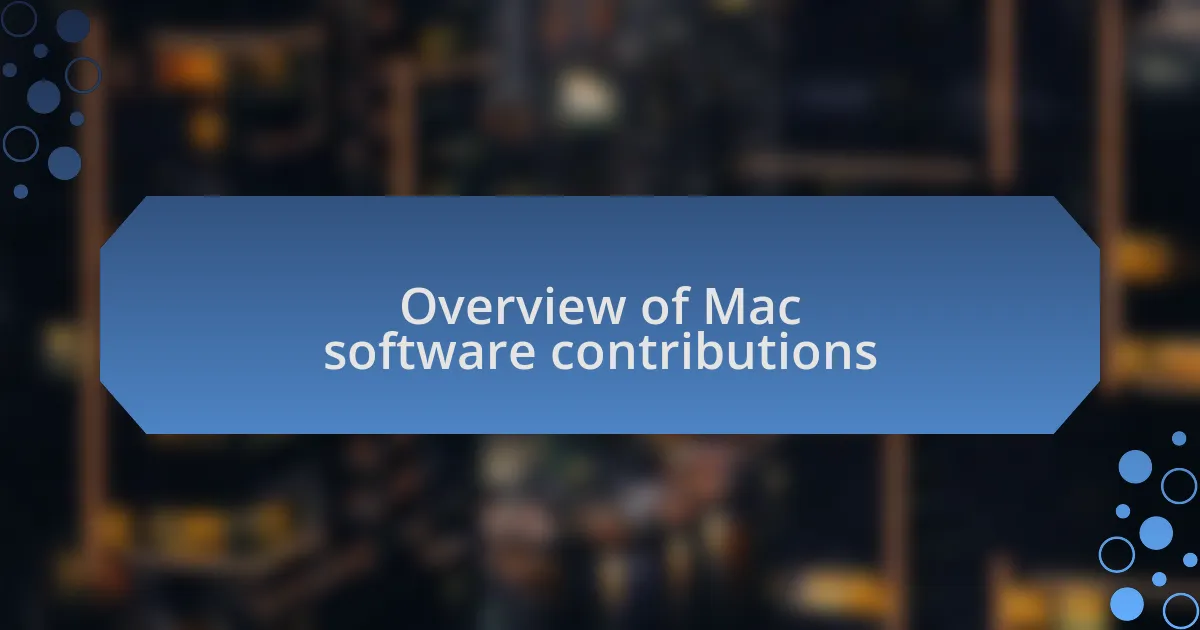
Overview of Mac software contributions
The realm of Mac software contributions is vibrant and diverse, reflecting both the versatility of macOS and the dedication of its community. When I first delved into contributing to a Mac application, I realized that even small enhancements could significantly impact user experience. It’s fascinating to see how a minor bug fix or a feature request can elevate an entire project, making it more user-friendly and efficient.
As I got involved with various open-source projects, I discovered that many developers are eager to share their insights and tools tailored specifically for Mac environments. I remember bonding with a contributor over our mutual love for a particular IDE, discussing ways to optimize its performance on macOS. Those conversations not only enriched my understanding but also made me appreciate the collective passion driving these projects. Have you ever found inspiration in a supportive community? It’s powerful how shared interests can fuel creativity and innovation.
Moreover, contributing to open-source Mac software offers an incredible learning experience that transcends traditional learning environments. I vividly recall stumbling upon a sophisticated library that was crucial for my project. Participating in its development was challenging yet exhilarating; I felt like I was part of something bigger. The thrill of navigating through the intricacies of macOS while collaborating with talented developers truly affirmed my love for programming. Isn’t it empowering to think that your contributions could help others harness the full potential of their Mac machines?
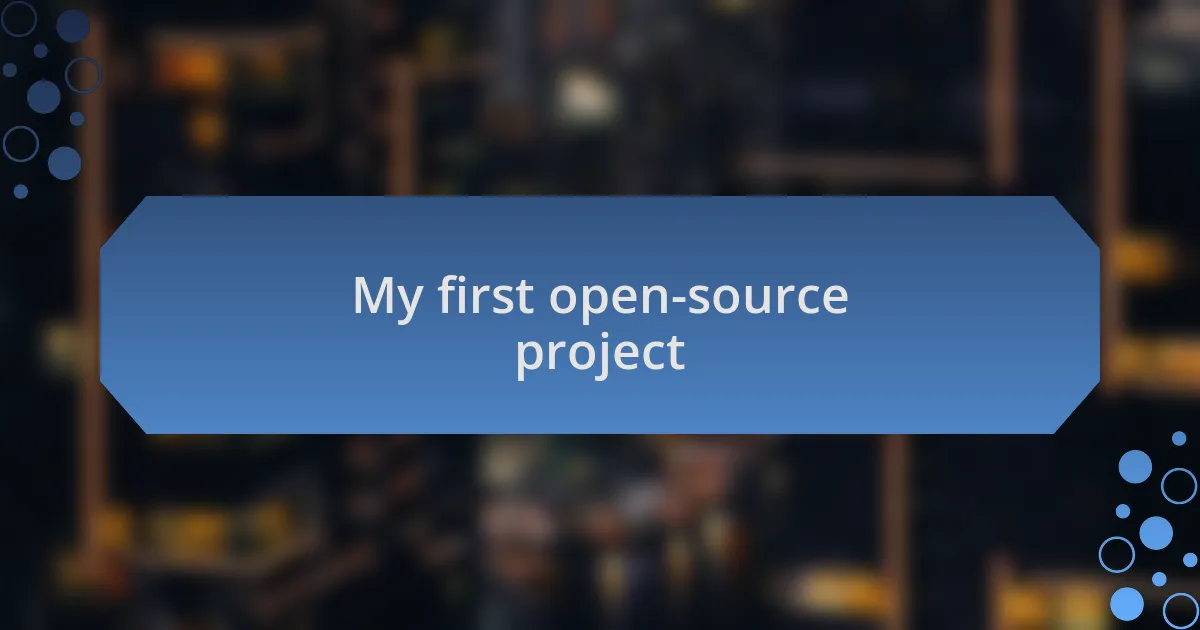
My first open-source project
I still vividly remember my first open-source project. It was a small utility aimed at enhancing the functionality of an existing Mac application. Initially, I felt overwhelmed by the sheer amount of code I had to sift through, but the thrill of contributing my own piece to an existing puzzle pushed me forward. I recall the moment I submitted my first pull request; the anticipation was tangible, and receiving feedback was both nerve-wracking and exhilarating.
Diving into that project taught me not just about coding but also about collaboration. I still smile when thinking about how I reached out to the lead developer for clarification on a few aspects. Their willingness to guide me through the process reinforced my belief in the community’s spirit of support. It made me wonder: how many others feel this same sense of camaraderie when they embark on their open-source journeys?
Reflecting on those early days, I can confidently say that the experience was transformative. I discovered that every contribution, no matter how small, adds value to the project and helps other users. It’s empowering to realize that my tiny code snippets could solve problems and enhance the experience for countless users. Have you ever felt that rush of making a difference? It’s an incredible feeling that keeps the passion for open-source contributions alive.
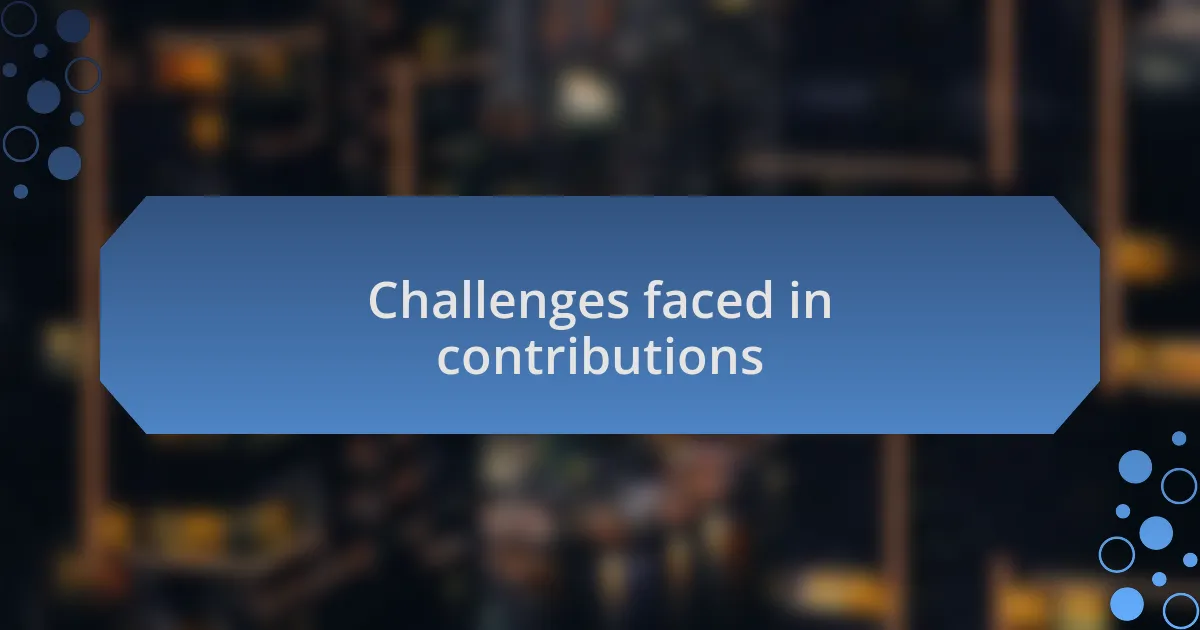
Challenges faced in contributions
As I dove deeper into open-source contributions, I quickly encountered the challenge of understanding existing codebases. It felt like learning a new language—one that was both fascinating and daunting. Have you ever looked at a line of code and thought, “What on earth does this mean?” I certainly have. It was a steep learning curve, but getting past that hurdle was immensely rewarding.
Another challenge I faced was managing the community’s expectations. I remember a time when I misinterpreted a feature request, leading me to submit a pull request that was ultimately rejected. The sting of that rejection taught me the importance of clear communication and thorough requirements gathering. How do you navigate the expectations of others while still being true to your vision? For me, it’s all about staying open to feedback and being willing to iterate.
Lastly, the issue of time management loomed large. Juggling a full-time job while dedicating evenings and weekends to contribute to open source was tough. There were nights when I felt too exhausted to code, yet somehow, the passion for the project fueled my late-night sessions. Have you ever had to balance your commitments in such a way? It’s a delicate dance, but I believe that prioritizing what truly matters can lead to fulfilling contributions.